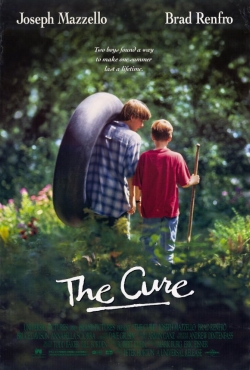| The Cure | |
|---|---|
 Theatrical release poster | |
| Directed by | Peter Horton |
| Written by | Robert Kuhn |
| Produced by | Mark Burg Eric Eisner |
| Starring | |
| Cinematography | Andrew Dintenfass |
| Edited by | Anthony Sherin |
| Music by | Dave Grusin |
Production company | |
| Distributed by | Universal Pictures |
Release date |
|
Running time | 98 minutes |
| Country | United States |
| Language | English |
| Budget | $10 million [1] |
| Box office | $2.57 million (US) [2] |
The Cure is a 1995 American drama film directed by Peter Horton and written by Robert Kuhn. The film stars Brad Renfro and Joseph Mazzello and follows an unlikely friendship between two boys, one of whom is suffering from AIDS. When the boys hear of a possible cure for the disease, they set out on a quest to find it.
Contents
- Plot
- Cast
- Production
- Development
- Casting
- Filming
- Soundtrack
- Reception
- Box office
- Critical response
- Accolades
- Home media
- References
- External links
The film was distributed by Universal Pictures and was released to theaters on April 21, 1995. It was not a box-office success, earning only $2.57 million. [2] Although The Cure received mixed reviews from critics, the performances of Mazzello and Renfro received acclaim and both actors earned Young Artist Awards nominations.
Horton received the Audience Award at the Cinekid Festival and Renfro won an award for Best Performance in a Drama Film at the first annual YoungStar Awards. The film also received a Grammy Award nomination for its score by Dave Grusin.